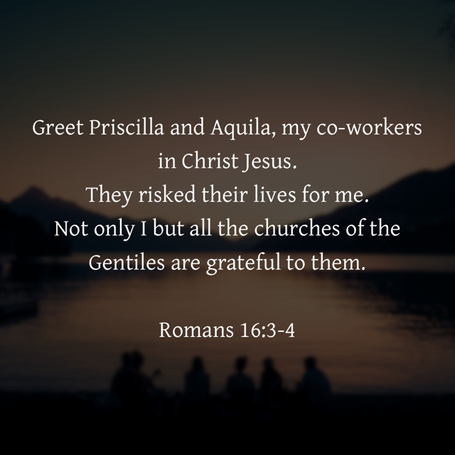|
Good morning!
We're so happy you've joined us! Today is the first Sunday in Lent.
When we meet together in person, we share our joys and concerns with each other before we focus on our Sunday school lesson. Think about your needs and concerns right now, and if you like, you can share them in the comments. This is a time when our church is beginning to think about searching for a new pastor. It is a challenging and exciting time, but as we pray about finding the right pastor for the future, we should remember that we are all coworkers with Christ and with each other in sharing the gospel right now.
The prayer below may serve to guide us in our opening prayer. It is from the Vanderbilt University website.
Your hand is upon your people, O God, to guide and protect them through the ages. Keep in your service those you have called and anointed, that the powers of this world may not overwhelm us, but that, secure in your love, we may carry out your will in the face of all adversity. Amen.
This week's scripture is Acts 18:1-3, 18-21, 24-26; Romans 16:3-4.
Introduction Although Paul is a towering figure in the New Testament, even he depended on other faithful coworkers in his ministry of spreading the Gospel throughout the Roman world. Today’s lesson includes encounters with the Jewish couple Priscilla and Aquila and a learned Jewish man named Apollos as well as Paul’s traveling partners Barnabas, Silas and Timothy. Lesson Context The book of Acts begins in Jerusalem and ends in Rome. The military and political center of the first century, Rome had a significant Jewish population. Christianity came to Rome early, likely within a few months after the resurrection of Christ. On the Day of Pentecost, visitors from Rome heard the gospel preached, and undoubtedly some of them were baptized (Acts 2:10, 41). Then they returned home to spread Christianity in the imperial city. That spread seems to have been confined to Jews for many years. As a result, Christians of Jewish background coexisted with unbelieving Jews in tight urban spaces, jockeying for control of various synagogues. Tensions grew; violence resulted. Rather than sort out the instigators, Emperor Claudius expelled all Jews from the city, whether Christian or non-Christian, in AD 49. Jews were not readmitted to the city until the death of Claudius in AD 54. These events form the backdrop of Paul’s meeting two Jews from Rome, Priscilla and Aquila, in Corinth in about AD 51. In the meantime, Christians of Gentile background in Rome established house churches (Romans 16:5, 10-11, 14-15), a development that caused some tension when Jewish Christians returned to the city. Making Tents: Acts 18:1-3 Paul’s first missionary journey is recorded in Acts 13 and 14. After that, the apostles convene in Jerusalem to decide how to oversee the church, which is starting to grow in various cities around the Roman Empire. Paul’s second missionary journey, which probably happened a couple of years after the first, is recorded in Acts 15:36 to Acts 18:22. Paul was planning to visit the churches he had established on the first journey. At first he and Barnabas were going to go together again, but they disagreed about whether to take John Mark along. Instead, they took separate trips, with Barnabas taking John Mark and with Paul taking Silas. They went north up the coast of the Mediterranean Sea, then west. It was in Berea that Paul left Silas with the young disciple Timothy and traveled south to Athens, where he did not have much success. Then he went about 50 miles west to the city of Corinth, a thriving city because it was a way station for ships going to and from Rome and the eastern parts of the empire. It had a synagogue as well as many pagan temples. As was his habit, Paul first went to the synagogue, and it was there he met a Jew named Aquila and his wife Priscilla. As mentioned above, they had been forced to leave Rome as part of an expulsion by Emperor Claudius. Because they and Paul were Jews and tentmakers, he stayed with them and they worked together. Even though Paul was a trained rabbi, all rabbis of this period also had a professional skill. As such, they worked with heavy materials such as leather or woven goat hair to produce durable tents meant to remain in semi-permanent locations. This is the origin of the term “tent-making ministry,” meaning a minister who receives part of his or her income from outside the church or para-church organization. Making Disciples: Acts 18:18-21 Paul stayed in Corinth for perhaps 18 months, but eventually he decided to return to Syria. Initially, Priscilla and Aquila accompany Paul, leaving their business in Corinth. They appear to have been companions in business and ministry. Luke does not say that they are Christians, but it seems to be the case. Before he sets sail, Paul has his hair cut off at Cenchreae as part of what seems to have been a Nazirite vow. This was a physical sign of a time of reflection and renewal. So Paul was continuing his Jewish practices, even though he also related as best he could to whoever he encountered. Next they traveled to Ephesus, the third-largest city in the Roman Empire and the capital of the province of Asia Minor. Paul leaves Priscilla and Aquila and goes into the synagogue. They asked him to spend more time with them, but he declined, apparently because he was in a hurry to get to Jerusalem in time for the Passover observance. However, he promises to return if it was God’s will. In fact, Acts records that Paul did return there. Making a Preacher: Acts 18:24-26 While Paul was in Ephesus, a Jew named Apollos arrived there. Apollos was a native of Alexandria, Egypt, which was famous as a center of knowledge. Not only did it house the world's most famous and extensive library, but it also was arguably the world center for Greek-thinking Judaism. Apollos was probably educated there in systematic interpretation of the Scriptures, using the methods of Greek philosophy. Although Apollos’s teaching was accurate, it was not complete. He knew about John’s baptism, but he knew nothing of Christian baptism. John’s baptism was a form of ritual cleansing that Jews did for themselves. Christian baptism is a symbol of dying to one’s former way of life and rising to life in Christ, which includes living in the power of the Holy Spirit. When Priscilla and Aquila heard him speak boldly, they invited them to their home and explained to him more fully the gospel message. The early church recognized the importance of preaching about Jesus, baptizing and the Holy Spirit. Apollos accepted their instruction and became one of the most influential preachers of the first century. Question: Under what circumstances would you correct someone’s inadequate knowledge of Scripture instead of “just letting it go”? Why? What texts in addition to Romans 14:5-6 and 1 Corinthians 8 help you decide? Leaders with Legacy: Romans 16:3-4 We finish this lesson with reference to a couple of verses in the greetings section of Paul’s letter to the Romans. Paul returned to Corinth during his third missionary journey and wrote to the church in Rome. He had never been there, but he knew many people there. He referred to Priscilla and Aquila as “co-workers in Christ Jesus,” a high honor. The Greek word that is translated “co-workers” is also the root from which we get our word “synergy.” Paul adds that this couple had risked their lives for him. It is not certain what incidents Paul is referring to. It might have been in Corinth, where Jewish opponents hauled him before the proconsul’s judgment seat. It might also have been in Ephesus, where Paul was saved from a riot by his “disciples,” which might have included the couple. However, it could also have been some other dangerous situation that was not recorded in scripture. Paul’s missionary travels were full of such moments. Personal correspondence The Sunday school lesson author writes about how his mother loved to encourage friends and family. She handwrote letters, cards and notes. She talked about things she was puzzled about in the Bible, something she heard in a sermon or a funny thing about her pets. At her funeral, the preacher read two letters from the many he had received from her. He told that those letters had a knack for arriving just when he needed encouragement the most. In times of need, he could reread a letter and be encouraged by his mother’s love. In the same way, we can reread Paul’s letters. How do his greetings to his coworkers encourage you? And how can you encourage a coworker of yours today?
Conclusion
We can learn a lot by considering the ministry of Priscilla and Aquila. They were a married couple who worked together and ministered as a team. Whether they were making tents or building up the people of God, there was no competition between them. They worked together and were willing to relocate whenever God called them. Their obedience to God’s will made them cherished companions of Paul. And so, Paul designated them with high praise as his coworkers. We also have the example of a sincere and talented preacher who willingly received private correction and teaching from believers who knew things that he did not. Apollos’s teaching was strong, but it omitted a crucial Christian doctrine. Priscilla and Aquila discreetly instructed him at the right time, and their investment yielded benefits later. Whether single like Paul or part of a couple like Priscilla and Aquila, all God’s people have responsibilities to one another. We must “hold unswervingly to the hope we profess … and consider how we may spur one another on toward love and good deeds” (Hebrews 10:23-24). Prayer Father, our churches need believers who are committed to ministries of upreach, outreach and inreach! Grant that we may be wise and knowledgeable to encourage and correct — and to be encourage and corrected. In Jesus’ name we pray. Amen.
Benediction
This week's benediction is from the King James Version.
Next week, our lesson will be on
0 Comments
Leave a Reply. |
AuthorWe are a small, rural Presbyterian church in southwestern Pennsylvania. Archives
July 2024
Categories
All
|



 RSS Feed
RSS Feed